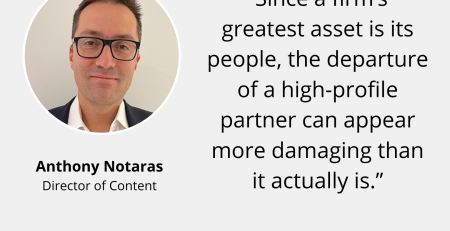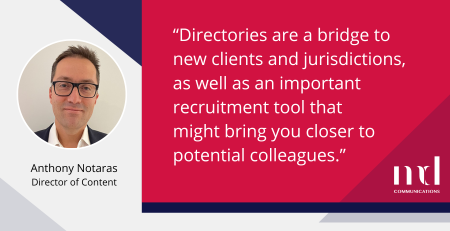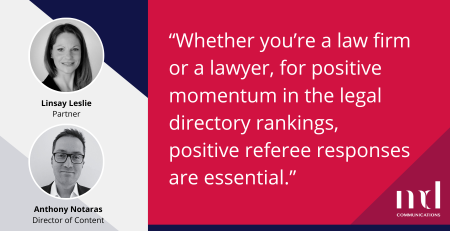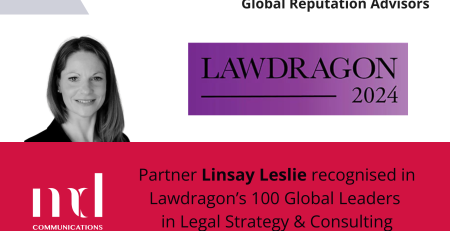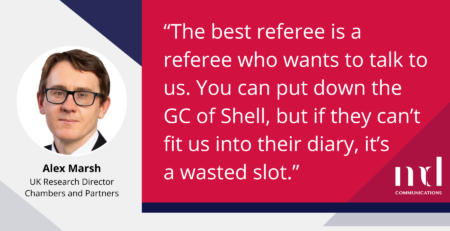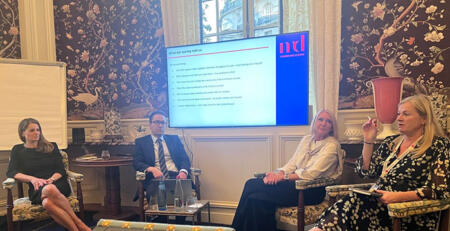In the second part of our interview with John van der Luit-Drummond, UK Bar and Asia Pacific editor at The Legal 500, John shares his top-five tips on how to improve your rankings, discusses mental wellbeing and diversity in the legal profession, and reveals his best and worst day in the office.
As someone working in the publishing industry, you know all about long working hours, dealing with copious amounts of content, tight deadlines, and having to perform under pressure. Do you see a greater awareness and appreciation for mental health initiatives within your own industry, and indeed, the legal profession?
Mental health and wellbeing is something all Legal 500 editors have an eye on – both for ourselves and for our team. Having been through one full research cycle, I’m acutely aware of the pressures involved in editing an annual guide as opposed to a weekly magazine. At times when I’ve been at the limit of my own endurance, my fellow editors have been there to support me.
The same goes for our researchers who work incredibly hard all year long. As editors we want them to know we’re here if they ever need help. Unfortunately, while we can try to manage stress or mental health issues internally, we can’t always stop external stressors. That’s why I get particularly angry when I hear examples of researchers being bullied by partners unhappy with the latest rankings. They have a hard enough job without being shouted at or belittled by a partner who has a bigger ego than practice.
Every industry and business can and must do better when it comes to mental health and wellbeing, and that includes the legal profession. Over the years, I’ve spoken to dozens of lawyers about the daily pressures they are under. Through tears, they’ve told me about breakdowns – both mini and large – and even about suicidal thoughts. And every year we see talented individuals leave the law, completely burnt out.
Yes, the nature of law means you’ll most likely be working in a high-pressure environment, but that doesn’t mean your firm or chambers can’t put procedures in place to minimise the impact that work has on you, and that if you are affected that you won’t be thought of as weak. There is a greater acknowledgment of this in recent years, but some firms seem to just pay lip service to the issue instead of tackling the problem head-on.
What about gender diversity in the legal profession? Specifically as someone who covers the UK Bar which isn’t traditionally diverse. Do you see that changing and what can the profession do to drive change?
Unlike law firms, it’s been comparatively easy for chambers to hide behind the self-employed nature of the Bar when it comes to the question of diversity – and I do mean all forms of diversity.
Women and BAME barristers account for 37.4% and 13% of the profession; both are below the national averages of 50.3% and 15.5% respectively. Moreover, just 15.8% of QCs are women; BAMEs account for 7.8%. Of the 108 QCs appointed in 2019, 88% of new silks were white. And when it comes to social mobility, the latest Bar Standards Board research suggests more than 15% of practising barristers attended fee-paying schools. That’s more than double the UK average of 7%. With the exception of the last statistic, all those figures are actually an improvement on previous years’ research.
Some chambers have tried to address this disparity through school outreach programmes, CV-blind recruitment, or unconscious bias training. Most recently 20 Essex Street adopted a contextual recruitment system to attract graduates from disadvantaged backgrounds. And, in a move that will benefit women and men alike, Coram Chambers has a paid parental leave policy for its barristers.
Things are improving but the pace of change is painfully slow. The only thing that may speed up the process is some form of external pressure from instructing solicitors, in a similar vein as we are seeing general counsel exert pressure on their panel firms to become more diverse. We are starting to see this from some firms. In the end, every chambers can do its bit to improve diversity, without compromising on quality; they just have to want to.
How do you think the industry is adapting to the new “metoo” environment?
There seems to be a shift where minimising reputational damage is now seen as more important than retaining the high earning power of some partners. We’ve seen Big Law show some big names the front door of late, which is encouraging, but I’m sceptical of press releases describing how inappropriate behaviour ‘goes against the culture of the firm’. In some instances, such behaviour has been going unchecked for years. Now, suddenly, firm culture is important?
Regardless of the motivations, certain firms and chambers are taking a lead on this issue, and in the April issue of fivehundred we published practical advice on how legal businesses can eradicate sexual harassment in the workplace and correctly respond to allegations should they emerge. I don’t think we’ve seen the last #metoo law allegation, however, and more heads are sure to roll.
As an aside, I was really heartened by the response we received to our recent article detailing researchers’ experiences of sexual harassment by lawyers. ‘The ugly side of law firm research’ went a bit viral on social media and the vast majority of commenters backed our position of excluding practices from our research should their lawyers act inappropriately.
What trends do you identify at the Bar for the future, in terms of technology use for delivery of legal services?
‘Tech at the Bar’ often makes me smile as some chambers had difficulty convincing their members that email was the future. The Bar has come a long way since then. I’m sure the current generation of juniors, and those that follow, will embrace whatever new tech comes their way and make it work for them and their clients.
I’m yet to be convinced that advances in artificial intelligence will decimate the ranks of the Bar. We’ll lose more barristers to ideological government cuts than to robot lawyers. I can foresee a decrease in some litigation and opinion writing on account of law firms and in-house counsel using Big Data to predict case outcomes, but when a dispute is unavoidable tech will be just another tool advocates can take advantage of.
What advice would you give to graduates seeking a career in legal publishing/and journalism?
First, it’s a specialist field, so you’ve got to be genuinely interested in it. Editors are usually good at recognising wannabe reporters who are just looking for a short-term stepping stone to something more ‘exciting’. When I left law I started blogging about legal issues and got an admin job at a specialist legal publisher. Six months later they hired me as a reporter. Six years later, I’m an editor at one of the world’s leading legal publishers.
Once in the field, you really need to immerse yourself in it – read everything you can to find about the legal profession and talk to as many lawyers as you can. There is so much content out there to mine, whether it be about the business of law or legal affairs. Practically every mainstream news story has a legal angle if you know where to look for it.
The biggest piece of advice I’d give is to really know the business behind your publication. Not every title is owned by a specialist legal publisher and run by people who understand both the publishing and legal markets, nor are they necessarily content led. Be wary of any title that has a culture of pushing sales ahead of editorial independence.
Finally, the legal publishing world is really small. Few reporters stay at the same publication their entire career. While you may not get on with everyone you meet, it pays to be respectful and professional. You never know where you might end up in the future.
What do you think the future is for law firms/chambers and the directories?
That’s a pretty big question – and one that more intelligent minds than mine are trying to answer! I don’t predict any radical changes in the near future as the profession has always been slow to evolve. We’re bound to see more consolidation; legal tech will make firms leaner in places; firms and chambers will increasingly look for lawyers with different skillsets; ownership models will change as the traditional partnership is not attractive to future generations. The same may be true for chambers, with tomorrow’s barristers wanting more security. None of this is new thinking.
As I said earlier, I don’t believe the directories are going anywhere anytime soon. We will have to evolve and keep up with in-house demands (something directories and law firms have in common!). We may not be there yet, but I wouldn’t be surprised if a future directory incorporated diversity data and CSR initiatives into rankings. We already know these are metrics used by in-house counsel in their decision-making.
As for The Legal 500, we must continue to bring our rankings to life each year through fivehundred, its sister titles, and comparative guides, and continue to engage with the profession through our GC Powerlists, conferences, and global summits. We also have some exciting, new developments in the pipeline. Unfortunately, all I can say for now is watch this space!
What are your top five tips for law firms/chambers getting themselves better ranked?
- Read the latest editorial guidelines once published online. Every year new practice areas are added, old ones combined or dropped entirely. Don’t waste your time submitting for something that no longer or never existed! There are also updates to the submission process, documents, and timelines. Don’t just think you can repeat what you did last year.
- Don’t assume all directories work in the same way or have the same rules. An easy example is referees: we have no limit on the number you can send us, whereas other directories do. If you only provide us with the same five or ten clients you send elsewhere, then you’re doing yourself a disservice.
- Complaining that another guide ranks you higher is not a winning argument for promotion or inclusion. Back up your submission with evidence, specifically, the information we want! If in doubt, read the guidelines or ask the editor. Also, listing awards given by other publications is a waste of your time and ours. We don’t take awards into account when ranking as it is hard for us to judge credibility of such accolades, we also do not know the factors taken into account to achieve the award. Moreover, just like with rankings, there’ll be another firm claiming they should have won it.
- Be realistic about what you hope to achieve in a given year. No practice is going to jump from tier 5 to tier 1 in a 12-month period, especially in a sophisticated market. It undermines your case if you insist the rankings are so out of sync with your version of market reality.
- Finally, the biggest mistake firms and chambers make is not asking for feedback. Ranking lawyers is not a dark art; we are transparent with our results. So if you want to understand why you haven’t been ranked or promoted, ask us. That can only help you when it comes to next year.
What has been your worst day in the office at Legal 500? And your best day?
The hours and days post-publication can be a blur as you turn from one ranking query to another but that initial deluge subsides after a couple of weeks. I haven’t yet *knocks on wood* had one of those days where I question my existence as an editor. Overall it’s a welcome change from litigants in person threatening defamation claims or government press officers sending angry emails about a story I’ve written.
As for my best day? On a personal level, it’s probably being asked to launch fivehundred. It’s still a work in progress but feedback to date has been very positive. More than that, though, are the days we as editors get to recognise the hard work and development of the research team. We’ve made a number of senior researcher and deputy editor promotions this past year. They’re a really talented bunch of researchers and writers, and I have no doubt there’ll be a few of them doing interviews like this in a few years’ time.



